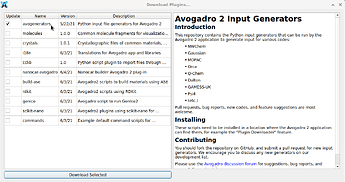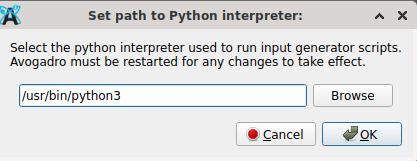A few questions to clarify the situation:
-
Do you observe the obstacle only for the generation of orca input files, or equally in attempt to create input files for other compuchem programs (Gaussian, MOPAC, etc)?
-
I’m not sure if this is relevant (because I already had an installation of Python3 and openbabel prior to running the Avogadro program [as AppImage for Linux in Linux Debian]), but do you recall if you run once the installation of the input generators? In Avogadro’s GUI, this would be Extensions → Download Plugins to yield this tableau to select from:
-
Avogadro’s GUI Extensions → Set Python Path does point to the correct interpreter? Though Linux Debian and Windows are organized differently
this (currently) refers in my case equally to Python 3.11.1. So the mere version/release of Python needn’t be the issue.
-
Because orca input files are a format openbabel is capable to write and export to (by the manual), and Avogadro interacts with openbabel closely, do you have a contemporary working installation of openbabel (sources available from the release page)? You can check this by
obabel -Vissued to the command line; for comparison, in Debian testing this currently reports
$ obabel -V
Open Babel 3.1.1 -- Jan 4 2023 -- 09:58:24
- With a openbabel up and well, are you able to replicate a test like the following about pyridine?
$ obabel -:"c1ccncc1" --gen3d -h -oorcainp
# ORCA input file
#
! insert inline commands here
* xyz 0 1
C 1.43303 0.05159 0.00100
C 0.68800 1.22595 0.00151
C -0.69423 1.12564 0.00218
N -1.36237 -0.04853 0.00552
C -0.61197 -1.17189 0.00692
C 0.77379 -1.17331 0.00332
H 2.51852 0.09036 -0.00113
H 1.17153 2.19630 0.00127
H -1.31976 2.01344 0.00006
H -1.17257 -2.10232 0.01145
H 1.32543 -2.10632 0.00270
*
1 molecule converted

